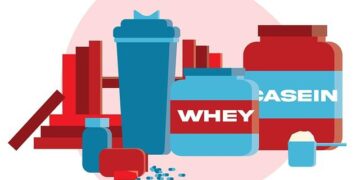Table of Contents
Section 1: The Scientific and Clinical Landscape of L-Glutamine
Navigating the world of dietary supplements requires a discerning eye, one capable of separating scientific fact from marketing fiction.
L-glutamine, a ubiquitous amino acid, is a prime example of a compound whose reputation is built on a complex mix of robust clinical data, promising preclinical research, and pervasive industry hype.
This section provides a foundational understanding of L-glutamine’s biochemistry and critically evaluates the evidence supporting its use for immune function, gut health, and athletic performance.
1.1 The Molecular Identity of L-Glutamine
L-glutamine is the most abundant free amino acid in the human body, circulating in the blood and stored in skeletal muscles.1
It is a fundamental molecule with a versatile and indispensable role in human physiology.
Its primary functions include serving as a building block for the synthesis of proteins, which are essential for tissue repair and maintenance.1
Beyond this structural role, L-glutamine is a key precursor for the creation of other vital molecules, including other amino acids and nucleotides, the building blocks of DNA and RNA.1
It also acts as the body’s primary shuttle for nitrogen, transporting it between tissues to support metabolic processes and facilitate the removal of waste products like ammonia.1
In nature, amino acids can exist in two mirror-image forms, or stereoisomers: an “L” form (levo, or left-handed) and a “D” form (dextro, or right-handed).
Within the context of human biology and nutrition, only the L-form is used by the body to build proteins and carry out metabolic functions.3
The D-glutamine form is considered biologically irrelevant for human nutrition.7
Therefore, when a food or supplement is referred to as containing “glutamine,” it is implicitly referring to the biologically active L-glutamine.4
1.2 The “Conditionally Essential” Nature of L-Glutamine
Amino acids are classified as either essential (must be obtained from the diet) or nonessential (can be synthesized by the body).
L-glutamine is technically a nonessential amino acid, as the body, primarily the muscles, can produce it in sufficient quantities to meet its needs under normal physiological circumstances.4
However, this classification changes under specific conditions of severe metabolic stress, leading to the designation of L-glutamine as “conditionally essential”.1
During periods of extreme physical trauma—such as major surgery, severe burns, widespread infection (sepsis), or critical illness—the body’s demand for glutamine skyrockets.4
Immune cells and cells of the intestinal lining, which divide rapidly, consume glutamine at a tremendous rate for fuel and proliferation.2
In these catabolic states, the body’s endogenous production cannot keep up with the demand, and glutamine levels in the blood and muscle can become severely depleted.1
This depletion can impair immune function and compromise the integrity of the gut barrier.
It is under these specific, clinically defined circumstances that obtaining glutamine from an external source (i.e., supplementation or specialized medical nutrition) becomes essential for recovery.2
A central point of contention in the supplement industry is the application of this “conditionally essential” status to healthy individuals undergoing voluntary physical stress, such as intense exercise.
While prolonged, exhaustive exercise can temporarily decrease plasma glutamine concentrations, the scientific community largely debates whether this physiological state is comparable to the severe metabolic crisis of a critically ill patient, a distinction that is fundamental to evaluating the claims made for supplementation in athletes.14
1.3 A Critical Review of L-Glutamine’s Efficacy: Evidence vs. Hype
The marketing of L-glutamine often presents a broad spectrum of benefits, from bolstering immunity to building muscle.
A rigorous analysis reveals a significant gap between the claims made for healthy populations and the scientific evidence, which largely supports its use in specific clinical contexts.
Understanding this “Efficacy Gap” is crucial for any consumer.
1.3.1 Immune Function
- The Mechanism: L-glutamine serves as a vital fuel source for the cells of the immune system, particularly lymphocytes and macrophages, which are the front-line defenders against pathogens.2 When the body is under severe stress and glutamine levels fall, the function of these cells can be compromised, potentially increasing susceptibility to infection.3
- The Evidence: The evidence for glutamine’s immunomodulatory effects is strongest in clinical populations. Studies involving critically ill or post-surgical patients have shown that glutamine supplementation, often administered intravenously, can reduce rates of infection and shorten hospital stays.4 This is where the “conditionally essential” nature of glutamine is most apparent and its benefits most pronounced.
For healthy athletes, the picture is far murkier. It has been hypothesized that the temporary dip in plasma glutamine after intense, prolonged exercise could be responsible for the “open window” of increased infection risk (e.g., upper respiratory tract infections or URTIs) that some endurance athletes experience.14 Some studies have supported this, finding that glutamine supplementation after exhaustive exercise may reduce the incidence of self-reported illness.16 However, this effect is not consistently observed, and a large-scale meta-analysis of clinical trials concluded that, in general, glutamine supplementation has no significant effect on the immune systems of athletes.15 The evidence suggests that while glutamine is essential for immune cells to function, the decrease seen after exercise in a well-nourished athlete may not be severe enough to compromise the immune system in a meaningful way.14
1.3.2 Gut Health and Intestinal Integrity
- The Mechanism: The cells lining the intestines, known as enterocytes, have a very high turnover rate and use glutamine as their preferred fuel source.11 Glutamine is critical for maintaining the tight junctions between these cells, which form a protective barrier.4 This barrier prevents bacteria, toxins, and undigested food particles from leaking from the gut into the bloodstream, a phenomenon often referred to as “leaky gut” or increased intestinal permeability.22
- The Evidence: This is one of the most compelling areas for L-glutamine supplementation. Its role in maintaining gut barrier function is well-established mechanistically.19 A Harvard-trained gastroenterologist rated L-glutamine supplements a “6 out of 10” for their potential benefits to gut health, a moderately positive endorsement.24 Clinical evidence shows promise for specific conditions. For example, a 2021 study found that when added to a low FODMAP diet, L-glutamine supplementation significantly improved symptoms in individuals with Irritable Bowel Syndrome (IBS).22
However, the benefits are not universal. For more severe inflammatory bowel diseases like Crohn’s disease, studies on oral glutamine supplementation have yielded less impressive and often insignificant results.13 For the general healthy population, while maintaining adequate glutamine levels through diet is important for gut health, the evidence that supplemental glutamine provides additional benefits is limited.26
1.3.3 Athletic Performance and Muscle Recovery
- The Claims: This is the area where marketing claims are most aggressive and the Efficacy Gap is widest. L-glutamine is heavily promoted in fitness circles as a key supplement for accelerating muscle repair, reducing post-workout muscle soreness (DOMS), preventing muscle breakdown (catabolism), and directly stimulating muscle growth.5
- The Evidence: The scientific support for these claims in healthy, well-nourished individuals is weak and largely refuted by higher-quality evidence. While a few small-scale studies have suggested that glutamine supplementation may modestly reduce muscle soreness and accelerate the recovery of peak force production after intense eccentric exercise 4, this finding is not consistently replicated and does not translate to overall improvements in performance or muscle building.
Multiple comprehensive systematic reviews and meta-analyses—the highest level of scientific evidence—have concluded that L-glutamine supplementation has little to no effect on muscle protein synthesis, body composition, strength gains, or aerobic performance in healthy individuals who are consuming adequate protein.13 The body’s natural stores and dietary intake appear sufficient to handle the demands of exercise without the need for extra supplementation for these purposes.
The disconnect between marketing and science in this area is so profound that it has resulted in legal action. In one notable case, a class-action lawsuit was filed against a major supplement company, alleging that its claims about glutamine’s muscle-building and recovery benefits were false and misleading, citing scientific studies that refuted these effects.34 This legal challenge underscores the critical need for consumers to be skeptical of claims that promise significant muscle gains from glutamine supplementation alone. It demonstrates a real-world consequence of extrapolating data from one context (clinical illness) and misapplying it to another (healthy athletes). The hierarchy of evidence is clear: while anecdotal reports and small studies may suggest a benefit, the weight of large-scale, systematic analysis does not support the use of L-glutamine as a primary anabolic or performance-enhancing agent.
Section 2: A Consumer’s Due Diligence Guide to L-Glutamine Powders
Given the complexities of L-glutamine’s efficacy, selecting a high-quality supplement requires a rigorous evaluation process.
In an industry with limited federal oversight, the burden of quality assurance falls on the consumer.
This guide provides a framework for assessing any L-glutamine powder, focusing on formulation, sourcing, third-party verification, and safety.
2.1 Deconstructing the Supplement Label: Formulation and Sourcing
The composition and origin of a supplement are the first indicators of its quality.
Discerning consumers should look beyond the front-of-label claims and scrutinize the details of what is in the container.
- Purity and Form: The vast majority of supplements on the market provide the standard, free-form amino acid L-glutamine. More advanced, stable forms exist, such as the dipeptide L-alanyl-L-glutamine. This dipeptide is known to be more stable in aqueous solutions and does not degrade as spontaneously as free-form L-glutamine.35 However, this form is primarily used in laboratory settings for cell culture and is not commonly found in commercial sports nutrition supplements, likely due to its higher cost. For the average consumer, a pure L-glutamine powder is the standard.
- Sourcing Matters: Fermented vs. Synthetic: A key differentiator among brands is the sourcing of the raw L-glutamine. Premium brands frequently emphasize that their product is derived from a fermentation process using plant-based starting materials like corn, beets, or glucose.28 This method produces a high-purity, vegan-friendly L-glutamine. This “fermented” narrative is often positioned as a clean, natural alternative to older, cheaper production methods, which some brands claim can involve sourcing from “sketchy animal sources like bird feathers, human hair, and shreds of animal carcasses”.38 While the primary advantage of fermented glutamine is its suitability for vegans and the assurance of a controlled, clean production process, there is no direct clinical evidence to suggest it is more bioavailable or effective than a high-purity, synthetically derived L-glutamine. The choice is often one of quality assurance, ethical preference, and avoidance of potential contaminants.
- The Micronization Question: Many brands market their L-glutamine powder as micronized, a process that reduces the particle size of the powder.40 The claim is that this finer powder leads to improved solubility in liquids and more rapid absorption by the body.41 From a practical standpoint, micronization can indeed improve mixability and reduce the gritty texture sometimes associated with amino acid powders. However, it is crucial to note that while the physical principle is sound, the available research does not include clinical trials that directly compare the bioavailability, absorption rates, or physiological outcomes of micronized versus regular L-glutamine in humans.40 Therefore, consumers should view “micronized” as a feature that primarily enhances the user experience (ease of mixing) rather than a scientifically proven enhancement of the supplement’s biological efficacy.
2.2 The Pillar of Trust: Third-Party Certifications
In the United States, the Food and Drug Administration (FDA) does not approve dietary supplements for safety or efficacy before they are marketed.12
This regulatory gap creates a “buyer beware” environment where the claims on a label may not match the contents of the bottle.
In this landscape, independent, third-party certifications have emerged as the most reliable tool for consumers to verify the quality, purity, and safety of a product.
The existence of these certifications has created a clear market segmentation.
Brands that invest in rigorous, costly testing signal a commitment to transparency and quality, targeting discerning consumers and athletes.
This contrasts with uncertified products that may compete on price but offer less assurance.
- The Athlete’s Gold Standard (NSF Certified for Sport®, Informed-Sport): For competitive athletes subject to anti-doping rules, these certifications are non-negotiable.
- NSF Certified for Sport®: This comprehensive program verifies that a product is manufactured in a GMP-compliant facility, that the contents match the label claims, and, most critically, that each batch is tested and found to be free of more than 290 substances banned by major athletic organizations, including stimulants, anabolic agents, and diuretics.45 Brands like Thorne and AG1 carry this certification.47
- Informed-Sport: This program provides a similar level of assurance, testing every batch of a product for banned substances before it is released to the market.49 It is recognized globally by anti-doping agencies and sports organizations. Kaged and Iron Vegan are examples of brands that use this certification.44
- Manufacturing Quality (cGMP, FDA-Registered Facility): These are foundational quality markers.
- cGMP (Current Good Manufacturing Practices): This is a set of regulations enforced by the FDA that ensures the identity, strength, quality, and purity of drug products by requiring that manufacturers of medications adequately control manufacturing operations. Many reputable supplement brands manufacture their products in cGMP-certified or compliant facilities.22
- FDA-Registered Facility: This simply means the manufacturing facility has registered with the FDA. It does not imply FDA approval or endorsement of the facility or its products.22
- Radical Transparency (Certificates of Analysis – COAs): The most transparent brands take an additional step by making their third-party testing results, known as Certificates of Analysis (COAs), publicly available. This allows a consumer to look up the specific batch number of their product and view the lab results verifying its purity and potency.22 Brands like Transparent Labs and Revive are known for this practice 44, and some thought leaders in the wellness space advocate that consumers should not consume any supplement without seeing such results.51
2.3 Dosage, Safety, and Risk Mitigation
While L-glutamine is generally well-tolerated, understanding appropriate dosing and potential risks is essential for safe use.
It is imperative to consult a healthcare provider before beginning any new supplement regimen.
- Determining an Effective Dose: Dosing for L-glutamine varies significantly depending on the intended use. In clinical settings for conditions like short bowel syndrome, doses can be very high, such as 30 grams per day taken in divided doses.52 For general athletic or wellness purposes, a daily dose of 5 to 10 grams is commonly recommended by brands and practitioners.12 Research has shown that acute intakes of 20 to 30 grams are generally without ill effect in healthy adults.14 However, it is important to reiterate that for most healthy people consuming a balanced diet rich in protein, their bodies produce and obtain enough glutamine to meet their needs, making supplementation unnecessary.4
- Comprehensive Safety Profile: L-glutamine is considered safe for most people, with side effects being generally mild and infrequent.9 Common complaints include minor gastrointestinal issues like constipation, nausea, bloating, or abdominal pain, as well as headache.25 However, there are several significant contraindications and potential risks that warrant serious consideration:
- Liver and Kidney Disease: Individuals with pre-existing liver or kidney disease should avoid L-glutamine supplementation. The body metabolizes glutamine into glutamate and ammonia; impaired organ function can lead to a dangerous buildup of ammonia in the blood, potentially worsening conditions like hepatic encephalopathy.6 A published case report detailed an instance of glutamine-induced hepatotoxicity (liver damage) in a 35-year-old female athlete, though the authors noted the possibility that unknown contaminants in the supplement could have been the cause.57
- Cancer: The relationship between glutamine and cancer is complex and requires strict medical supervision. On one hand, cancer cells are highly dependent on glutamine for their growth and proliferation, consuming it at a much higher rate than healthy cells.4 This raises the theoretical concern that supplementation could fuel tumor growth.53 On the other hand, some studies suggest glutamine can help heal tissues and reduce side effects like mucositis (inflammation of the digestive tract) in patients undergoing chemotherapy or radiation.4 This dual role means that glutamine should never be used by cancer patients without the explicit guidance of their oncology team.
- Other Conditions: Caution is advised for individuals with certain neurological or psychiatric conditions. Because glutamine is a precursor to the neurotransmitter glutamate, there is concern it could increase the risk of seizures in those with seizure disorders or trigger manic episodes in people with bipolar disorder.9 Individuals with a known sensitivity to monosodium glutamate (MSG) may also react to glutamine supplements.13
Section 3: Market Analysis: A Comparative Review of Leading L-Glutamine Brands
Applying the due diligence framework from the previous section, this market analysis provides a practical comparison of prominent L-glutamine powder supplements.
The goal is to translate abstract quality markers into a concrete evaluation of available products, empowering consumers to make a choice that aligns with their specific needs, priorities, and budget.
3.1 Evaluation Framework
Each product is assessed based on a consistent set of criteria derived from the principles of safety, transparency, and value:
- Purity & Formulation: Examines whether the product is 100% L-Glutamine and details its sourcing (e.g., fermented, vegan) and any special processing (e.g., micronized).
- Certification & Safety: Identifies the level of third-party testing, including elite sports certifications (NSF Certified for Sport®, Informed-Sport), baseline manufacturing standards (cGMP), and the availability of public testing results (COAs).
- Value & Cost-Effectiveness: Calculates the price per gram to allow for a direct comparison of cost, independent of container size or serving suggestions.
- Brand Transparency & Reputation: Considers the brand’s overall market standing, customer service policies (such as money-back guarantees), and consumer feedback.
3.2 Table: Comparative Analysis of Top L-Glutamine Powders
The following table synthesizes key data points for a selection of leading L-glutamine powders, offering an at-a-glance comparison to facilitate an informed decision.
| Brand | Product Name | Sourcing / Form | Key Features | Third-Party Certification | Cost per 500g Container (Approx.) | Cost per 5g Serving (Approx.) | Pros | Cons |
| Thorne | L-Glutamine Powder | Not specified, but free of gluten, dairy, soy | Unflavored Powder | NSF Certified for Sport® | $63.00 (504g tub) | $0.63 | Elite certification for athletes; trusted by healthcare practitioners; high-quality manufacturing. | Highest price point; lower dose per scoop (5g). |
| Kaged | Glutamine | Fermented Vegan | Unflavored, Micronized Powder | Informed-Sport Certified | $24.99 (500g tub) | $0.25 | Excellent value; elite certification for athletes; 100 servings per container; good return policy. | Frequently sold out; testing results not easily accessible on website. |
| Transparent Labs | BCAA Glutamine | Vegan | Blended Formula (5g Glutamine, 8g BCAAs, Vitamin C, Coconut Water) | Third-party tested; public COAs | $39.99 (for 30 servings) | $1.33 (for combined serving) | Excellent for all-in-one workout recovery; full label transparency; flavored options. | Not a pure glutamine product; high cost per serving; flavors limit mixability. |
| Revive | Glutamine | Vegan, Soy-Free, Gluten-Free | High-Dose (10g per serving) Powder | Third-party tested; public results | $19.99 (300g tub) | $0.33 | High 10g dose per serving is effective for gut health; good mixability. | Strict 15-day return policy with store credit only; no money-back guarantee. |
| Nutricost | L-Glutamine Powder | Vegetarian, Gluten-Free, Non-GMO | Flavored & Unflavored Powder Options | cGMP Compliant, FDA-Registered Facility | $22.95 (500g tub) | $0.23 | Extremely cost-effective, especially in bulk (1kg); wide variety of flavors. | Lacks elite sports certifications; baseline quality assurance. |
| Naked Nutrition | Naked Glutamine | Fermented Vegan | Single-Ingredient, Unflavored Powder | Third-party tested for heavy metals | $34.99 (1kg tub) | $0.17 | Minimalist “one ingredient” philosophy; vegan; excellent value in bulk. | Lacks specific sports certifications. |
| Iron Vegan | Fermented L-Glutamine | Fermented Vegan (from beets/corn) | Unflavored Powder | Informed-Sport Certified | $28.99 (400g tub) | $0.36 | Elite certification for athletes; explicitly vegan from non-GMO sources. | Higher cost per serving compared to other vegan options like Kaged. |
| NOW Foods | L-Glutamine Powder | Free-form amino acid | Unflavored Powder | cGMP Compliant; Steroid Tested | $24.49 (454g tub) | $0.27 | Reputable brand with a long history; very affordable; widely available. | Lacks elite sports certifications. |
Note: Prices are approximate and subject to change based on retailer and promotions.
Cost per serving is calculated based on a standard 5g dose for comparability.
3.3 In-Depth Product Profiles
- Thorne L-Glutamine Powder: Thorne represents the pinnacle of quality and trust in the supplement industry, often recommended by healthcare practitioners. Its L-Glutamine powder is NSF Certified for Sport®, making it a go-to choice for professional and collegiate athletes who require absolute certainty about product purity and safety from banned substances.22 This certification, combined with Thorne’s reputation for rigorous research and manufacturing, justifies its premium price point. It is the ideal choice for those for whom quality and safety are the absolute highest priorities.
- Kaged Glutamine: Kaged has carved out a niche by offering high-quality, athlete-focused supplements at an exceptional value. Its glutamine is Informed-Sport Certified, providing the same level of banned-substance testing as Thorne but at a significantly lower cost-per-gram.44 The product is also vegan, sourced from a patented fermentation process.38 Its primary drawback is its popularity, which often leads to it being sold out.44 For the serious athlete on a budget, Kaged is arguably the best value proposition on the market.
- Transparent Labs BCAA Glutamine: This product is not a standalone glutamine supplement but rather a comprehensive workout recovery formula. It combines 5g of L-glutamine with 8g of branched-chain amino acids (BCAAs), which have their own body of evidence for reducing muscle soreness and improving protein synthesis.44 The brand lives up to its name with exceptional transparency, publishing batch-specific Certificates of Analysis on its website.44 This is an excellent choice for individuals seeking the convenience of an all-in-one recovery drink, but it is not suitable for those who want to supplement with glutamine alone.
- Nutricost L-Glutamine Powder: Nutricost is the undisputed leader for budget-conscious consumers. It offers pure L-glutamine powder at an extremely low cost-per-gram, particularly when purchased in bulk 1kg tubs.22 The brand also provides a wide array of flavor options, a rarity in this category.22 While its products are made in a cGMP-compliant, FDA-registered facility, they lack the elite sports certifications of Thorne or Kaged.22 This makes Nutricost an excellent choice for general wellness users or casual gym-goers, but less suitable for competitive athletes.
- Revive Glutamine: Revive’s key differentiator is its high-dose formulation, providing 10g of L-glutamine per serving, which is closer to the dosages used in some clinical studies for gut health.44 The company is transparent, with third-party testing results available to the public. However, its customer service policies are less favorable, with a strict return window and refunds issued as store credit rather than cash back.44
- Naked Nutrition Naked Glutamine: This brand appeals to the minimalist consumer. Its product contains only one ingredient: fermented L-glutamine from vegan sources.28 The company emphasizes its commitment to purity by providing third-party testing for heavy metals. With its large 1kg container, it offers outstanding value for those looking for a clean, simple, and vegan-friendly product without the need for specific sports certifications.28
3.4 The Landscape of User Experience: Acknowledging Ambiguity
An analysis of user-generated reviews and forum discussions, particularly on platforms like Reddit, reveals a starkly polarized landscape of anecdotal experience.61
This division is not random; it reflects the “conditionally essential” nature of glutamine itself.
On one side, many users report profound benefits, especially for gut health.
Testimonials often describe it as a “game-changer” or “black magic” for alleviating symptoms of IBS, bloating, and digestive distress.61
These positive experiences likely come from individuals who have a genuine physiological need—a compromised gut barrier or a diet low in protein—where supplementation is correcting a deficit.
On the other side, a large contingent of users, particularly those taking it for athletic performance, report no noticeable effects whatsoever.61
Comments like “don’t waste your money” and “unlikely to do anything you can notice” are common in discussions among well-nourished athletes.62
This is consistent with the high-level scientific evidence showing a lack of benefit for muscle growth in this population.
These individuals likely already have sufficient glutamine levels from their diet, so adding more provides no additional advantage.
Common minor complaints across various brands include gastrointestinal upset, especially when starting supplementation 56, and practical issues like missing scoops in the container.65
This polarized feedback loop highlights the importance of managing expectations: L-glutamine is not a universal panacea.
Its effectiveness is highly dependent on the user’s baseline health status and the specific reason for supplementation.
Section 4: Tailored Recommendations and Final Verdict
The selection of the “best” L-glutamine powder is not a one-size-fits-all determination.
It is a decision that must be tailored to the individual’s specific goals, health status, athletic commitments, and budget.
The optimal choice for a professional athlete is different from that for an individual seeking gut support.
This section synthesizes the preceding analysis into targeted recommendations for distinct user profiles.
4.1 For the Competitive or Collegiate Athlete
- Primary Consideration: The absolute priority for any athlete competing under the regulations of an anti-doping agency is to eliminate the risk of inadvertent doping from a contaminated supplement. Therefore, the only acceptable products are those bearing a trusted third-party certification that tests for banned substances on a batch-by-batch basis.
- Recommendation: Choose a product that is NSF Certified for Sport® or Informed-Sport Certified.
- Top Choices:
- Thorne L-Glutamine Powder: The premium choice for those who prioritize the highest level of quality assurance and trust from the NSF Certified for Sport® seal.47
- Kaged Glutamine: The best value choice, offering Informed-Sport certification and a vegan-fermented source at a highly competitive price point.38
- Iron Vegan Fermented L-Glutamine: An excellent alternative to Kaged, also Informed-Sport certified and explicitly derived from non-GMO vegan sources.50
4.2 For General Wellness & Gut Health Support
- Primary Consideration: For individuals using L-glutamine to support intestinal health, the focus shifts from banned substance testing to overall purity, quality, and adequate dosage.
- Recommendation: Select a pure, unflavored powder from a transparent brand that utilizes cGMP manufacturing and provides third-party testing for purity and contaminants like heavy metals.
- Top Choices:
- Revive Glutamine: A strong option for those seeking a higher dose (10g per serving), which aligns more closely with dosages used in some gut health studies.44
- Naked Glutamine: Ideal for the consumer who values simplicity and a “clean” label. Its single-ingredient, fermented vegan formula, and testing for heavy metals make it a trustworthy choice.28
- Nutricost L-Glutamine Powder: A reliable and highly affordable option for those who do not require elite certifications but want a product from a cGMP-compliant facility.22
4.3 For the Budget-Conscious Consumer
- Primary Consideration: The key metric for value is the cost-per-gram. This is best achieved by purchasing in bulk quantities (typically 1kg tubs).
- Recommendation: Focus on brands that offer large container sizes at a low price point without sacrificing baseline quality standards (cGMP manufacturing).
- Top Choices:
- Nutricost L-Glutamine Powder: Consistently offers one of the lowest costs per gram on the market, making it the top choice for maximizing quantity per dollar.22
- Kaged Glutamine: While athlete-certified, its standard price for a 500g tub is extremely competitive, offering a rare combination of elite certification and excellent value.44
4.4 For All-in-One Performance (Glutamine + BCAAs)
- Primary Consideration: This category is for individuals who want the convenience of a combined recovery product and are interested in the potential benefits of both L-glutamine and branched-chain amino acids (BCAAs).
- Recommendation: Look for a blended product from a transparent brand that clearly states the dosage of each active ingredient.
- Top Choices:
- Transparent Labs BCAA Glutamine: A standout in this category due to its full label transparency, inclusion of supporting ingredients like Vitamin C, and public availability of COAs.44
- Designs for Health BCAA Powder with L-Glutamine: Another high-quality option that combines these amino acids, manufactured in a cGMP-certified facility and third-party tested.22
4.5 A Note on L-Glutamine in Wellness Blends
It is increasingly common to find L-glutamine included as a supporting ingredient in complex formulas, such as collagen powders, greens powders, or gut health blends.
For example, mindbodygreen’s Beauty & Gut Collagen+ product contains 500 mg (0.5g) of L-glutamine per serving alongside collagen, vitamins, and other compounds.66
While the inclusion of glutamine in these products is based on its known role in supporting the gut lining, consumers should be aware that the dosage is often far below the therapeutic levels (e.g., 5g to 30g) used in studies that demonstrated significant clinical effects for gut repair or immune support.
A 500 mg dose may offer some supportive benefit, but it should not be relied upon as a primary intervention for managing significant gut health issues.
Conclusion: Synthesizing the Evidence for an Informed Choice
L-glutamine is an amino acid of significant biological importance, with a firmly established, evidence-based role in clinical nutrition for supporting patients through periods of severe metabolic stress.
Its utility in these settings is undeniable.
The evidence also points toward a promising, albeit still developing, role for targeted supplementation in managing certain gastrointestinal conditions, such as Irritable Bowel Syndrome.
However, a critical Efficacy Gap exists between these specific applications and the supplement’s widespread promotion as a cornerstone for muscle growth and athletic performance in the general healthy population.
The weight of high-quality scientific evidence, including multiple systematic reviews and meta-analyses, does not support the claims that L-glutamine supplementation enhances muscle mass, strength, or performance in well-nourished individuals.
This disconnect has been significant enough to spur legal challenges against brands for false advertising.
Ultimately, the “best” L-glutamine powder is not a universal product but rather the one that is most appropriately matched to a well-defined, evidence-supported need.
- For the competitive athlete, the best product is one that guarantees purity and safety from banned substances through rigorous third-party certifications like NSF Certified for Sport® or Informed-Sport.
- For the individual addressing specific gut health concerns, the best product is a pure, high-quality powder from a transparent, reputable brand, taken at an appropriate dose.
- For the average, healthy gym-goer consuming adequate dietary protein, the most prudent and evidence-based conclusion is that L-glutamine supplementation is likely unnecessary, as their dietary intake and endogenous production are sufficient to meet the demands of exercise.4
This report provides a comprehensive framework for evaluation, but it is not a substitute for professional medical advice.
Before beginning any new supplement regimen, particularly one with the potential for interaction and contraindication like L-glutamine, a consultation with a qualified healthcare professional or a registered dietitian is strongly recommended.
Works cited
- Glutamine metabolism and its physiologic importance – PubMed, accessed on August 8, 2025, https://pubmed.ncbi.nlm.nih.gov/2205730/
- Glutamine: Metabolism and Immune Function, Supplementation and Clinical Translation – PMC – PubMed Central, accessed on August 8, 2025, https://pmc.ncbi.nlm.nih.gov/articles/PMC6266414/
- Glutamine: Benefits, Uses and Side Effects – Healthline, accessed on August 8, 2025, https://www.healthline.com/nutrition/glutamine
- Glutamine: What It Is, Benefits & Side Effects – Cleveland Clinic, accessed on August 8, 2025, https://my.clevelandclinic.org/health/articles/glutamine
- L- Glutamine — AS-IT-IS Nutrition, accessed on August 8, 2025, https://asitisnutrition.com/collections/l-glutamine
- Glutamine Supplementation — Evidence Indicates It May Benefit Patients With Critical Illness – Today’s Dietitian, accessed on August 8, 2025, https://www.todaysdietitian.com/newarchives/011211p40.shtml
- To Your Health: What is the difference between l-glutamine and glutamine, and the same for the other amino acids? – Columns – The Austin Chronicle, accessed on August 8, 2025, https://www.austinchronicle.com/columns/2006-06-23/378574/
- Can someone explain the differences between Glutamine and L-Glutamine? – Reddit, accessed on August 8, 2025, https://www.reddit.com/r/askscience/comments/1qhufm/can_someone_explain_the_differences_between/
- Glutamine: Health Benefits, Safety Information, Dosage, and More – WebMD, accessed on August 8, 2025, https://www.webmd.com/diet/health-benefits-glutamine
- Why is L-glutamine metabolism important to cells of the immune system in health, postinjury, surgery or infection? – PubMed, accessed on August 8, 2025, https://pubmed.ncbi.nlm.nih.gov/11533304/
- Glutamine’s Benefits: Muscle and Gut Recovery – Steve O’s Baseball Umpire Resources, accessed on August 8, 2025, https://www.stevetheump.com/Baseball_Muscle_Recovery.htm
- Glutamine: What You Need to Know (from a Sports Nutritionist) – Health Stand Nutrition, accessed on August 8, 2025, https://www.healthstandnutrition.com/what-is-glutamine/
- GLUTAMINE: Overview, Uses, Side Effects, Precautions, Interactions, Dosing and Reviews, accessed on August 8, 2025, https://www.webmd.com/vitamins/ai/ingredientmono-878/glutamine
- Dosing and efficacy of glutamine supplementation in human exercise and sport training, accessed on August 8, 2025, https://pubmed.ncbi.nlm.nih.gov/18806122/
- The effect of glutamine supplementation on athletic performance, body composition, and immune function: A systematic review and a meta-analysis of clinical trials – PubMed, accessed on August 8, 2025, https://pubmed.ncbi.nlm.nih.gov/29784526/
- L-Glutamine Supplements: A Sales-Free Look – Diet vs Disease, accessed on August 8, 2025, https://www.dietvsdisease.org/l-glutamine-supplements/
- Should Endurance Athletes take Glutamine supplements? – Blueprint Nutrition, accessed on August 8, 2025, https://www.blueprintnutrition.ca/should-endurance-athletes-take-glutamine-supplements/
- L-Glutamine Explained / Science in Sport Blog, accessed on August 8, 2025, https://www.scienceinsport.com/sports-nutrition/l-glutamine-explained-sis/
- Benefits of an L-Glutamine Supplement – Nutritional Weight and Wellness, accessed on August 8, 2025, https://www.weightandwellness.com/resources/articles-and-videos/l-glutamine-deficiency-signs-supplement-benefits
- Are L-Glutamine Supplements Worthy Of The Hype? – The Well by Northwell, accessed on August 8, 2025, https://thewell.northwell.edu/healthy-living-fitness/l-glutamine-supplements
- Glutamine: the Amino Acid for Gut Health & Muscle Growth – Dr. Axe, accessed on August 8, 2025, https://draxe.com/nutrition/l-glutamine-benefits-side-effects-dosage/
- The Best L-Glutamine Supplements in 2025 – Healthline, accessed on August 8, 2025, https://www.healthline.com/nutrition/best-l-glutamine-supplement
- Pawbiotix Review’S and ComplaintS ~ (Across the US and UK) An Honest Customer Reviews! On Reddit (VJ2KWUDN) – Genomics Workshop |, accessed on August 8, 2025, https://genomicsworkshop.isr.umich.edu/wp-content/uploads/ninja-forms/tmp/nftmp-NVuRR-pawbiotixengineer9m6rqgq6.pdf
- Harvard gastroenterologist ranks popular trends: Is eating cold rice, doing intermittent fasting good for gut health? – Hindustan Times, accessed on August 8, 2025, https://www.hindustantimes.com/lifestyle/health/harvard-gastroenterologist-ranks-popular-trends-is-eating-cold-rice-doing-intermittent-fasting-good-for-gut-health-101750042948904.html
- L-glutamine for IBS: Benefits, side effects, and research – Medical News Today, accessed on August 8, 2025, https://www.medicalnewstoday.com/articles/320850
- Guttok: Are L-Glutamine Supplements Needed for Gut Health in Healthy Populations? – Practice-based Evidence in Nutrition, accessed on August 8, 2025, https://www.pennutrition.com/TrendingTopic.aspx?id=29680
- Boost Muscle Growth with L-Glutamine: A Quick Guide for Athletes and Fitness Enthusiasts, accessed on August 8, 2025, https://healthyhey.com/blogs/best-supplements-blog/boost-muscle-growth-with-l-glutamine-a-quick-guide-for-athletes-and-fitness-enthusiasts
- L Glutamine Powder Supplement – Naked Nutrition, accessed on August 8, 2025, https://nakednutrition.com/products/glutamine
- How does Glutamine Benefit in body building – Fastandup, accessed on August 8, 2025, https://in.fastandup.com/blogs/vitamins-and-supplements/how-does-glutamine-helps-in-body-building
- The Influence of Oral L-Glutamine Supplementation on Muscle Strength Recovery and Soreness Following Unilateral Knee Extension Eccentric Exercise – PubMed, accessed on August 8, 2025, https://pubmed.ncbi.nlm.nih.gov/25811544/
- Effect of Glutamine Supplementation on Muscular Damage Biomarkers in Professional Basketball Players – MDPI, accessed on August 8, 2025, https://www.mdpi.com/2072-6643/13/6/2073
- The Battle Of The Supplements | L-Glutamine vs Creatine – Gymshark, accessed on August 8, 2025, https://www.gymshark.com/blog/article/supplements-l-glutamine-vs-creatine
- Glutamine as an Anti-Fatigue Amino Acid in Sports Nutrition – PMC – PubMed Central, accessed on August 8, 2025, https://pmc.ncbi.nlm.nih.gov/articles/PMC6520936/
- Consumers Seek Class Status Over Fraudulent Labeling On Muscle Recovery Supplement, accessed on August 8, 2025, https://counselfinancial.com/litigation-counsellor/muscle-recovery-supplement
- GlutaMAX Supplement and L-Glutamine for Cell Culture – Thermo Fisher Scientific, accessed on August 8, 2025, https://www.thermofisher.com/us/en/home/life-science/cell-culture/mammalian-cell-culture/media-supplements/glutamax-media.html
- L-Glutamine – Wheyland, accessed on August 8, 2025, https://wheyland.com/en/producto/l-glutamine/
- Is L-Glutamine Fermented? (How We Make Gut L-Glutamine) – Essential Stacks, accessed on August 8, 2025, https://essentialstacks.com/blogs/gut-health/is-l-glutamine-fermented
- Fermented Glutamine Powder – Recovery – kaged, accessed on August 8, 2025, https://www.kaged.com/products/glutamine
- TruGlutamine Powder | Fermented Vegan L-Glutamine Powder – PEScience, accessed on August 8, 2025, https://pescience.com/products/truglutamine
- Micronized L-Glutamine Amino Acid 5000 mg | Natural Factors USA, accessed on August 8, 2025, https://naturalfactors.com/products/l-glutamine-5-g-amino-acid
- What is L-Glutamine and What Can it do For You? – Bodylogix, accessed on August 8, 2025, https://www.bodylogix.com/blogs/training-advice/what-is-l-glutamine-and-what-can-it-do-for-you
- Micronized and Fermented Glutamine – La Boite à Grains, accessed on August 8, 2025, https://laboiteagrains.com/en/products/micronized-and-fermented-glutamine-preferred-nutrition
- Cytology use for cervical cancer screening in Portugal: results from …, accessed on August 8, 2025, https://www.ncbi.nlm.nih.gov/pmc/articles/PMC3966282/
- Best Glutamine Supplement | Our Top 4 in 2025 – Innerbody Research, accessed on August 8, 2025, https://www.innerbody.com/best-glutamine-supplement
- Pure Power L-Glutamine – NSF Certified for Sport – Unflavored — 5 g – 100 Servings, accessed on August 8, 2025, https://www.vitacost.com/pure-power-l-glutamine-nsf-certified-for-sport-
- Certified Product Results | NSF International Certified for Sport®, accessed on August 8, 2025, https://www.nsfsport.com/certified-products/search-results.php?keyword=glutamine
- L-Glutamine Powder & Reviews – Thorne, accessed on August 8, 2025, https://www.thorne.com/products/dp/l-glutamine-powder
- 75+ High-Quality Ingredients | AG1®, accessed on August 8, 2025, https://drinkag1.com/about-ag1/ingredients/ctr
- Informed Sport: Sports Supplements Certification, accessed on August 8, 2025, https://sport.wetestyoutrust.com/
- Fermented L-Glutamine – Iron Vegan, accessed on August 8, 2025, https://www.ironvegan.ca/products/fermented-l-glutamine
- Blueprint Bryan Johnson, accessed on August 8, 2025, https://blueprint.bryanjohnson.com/
- Glutamine (oral route) – Side effects & dosage – Mayo Clinic, accessed on August 8, 2025, https://www.mayoclinic.org/drugs-supplements/glutamine-oral-route/description/drg-20064099
- Side effects of long-term glutamine supplementation – PubMed, accessed on August 8, 2025, https://pubmed.ncbi.nlm.nih.gov/22990615/
- L-glutamine: MedlinePlus Drug Information, accessed on August 8, 2025, https://medlineplus.gov/druginfo/meds/a617035.html
- L-glutamine powder for oral solution – Cleveland Clinic, accessed on August 8, 2025, https://my.clevelandclinic.org/health/drugs/23708-l-glutamine-powder-for-solution
- What are the side effects of L-Glutamine? – Patsnap Synapse, accessed on August 8, 2025, https://synapse.patsnap.com/article/what-are-the-side-effects-of-l-glutamine
- Glutamine – Memorial Sloan Kettering Cancer Center, accessed on August 8, 2025, https://www.mskcc.org/cancer-care/integrative-medicine/herbs/glutamine
- Glutamine powder-induced hepatotoxicity: it is time to understand the side effects of sports nutritional supplements – PubMed Central, accessed on August 8, 2025, https://pmc.ncbi.nlm.nih.gov/articles/PMC7069532/
- 5 Best L-Glutamine Supplements of 2025 [Full Comparison] – Momentous, accessed on August 8, 2025, https://www.livemomentous.com/blogs/all/best-l-glutamine-supplement
- L-Glutamine – iHerb, accessed on August 8, 2025, https://www.iherb.com/c/l-glutamine
- Neurozoom Reviews & Complaints (2025) What You Need to Know Before Buying (1W0J4ELX), accessed on August 8, 2025, https://dpi.uillinois.edu/wp-content/uploads/ninja-forms/tmp/nftmp-D4vcU-neurozoomhalalz990c.pdf
- Do u think L-glutamine is the key? : r/AdvancedRunning – Reddit, accessed on August 8, 2025, https://www.reddit.com/r/AdvancedRunning/comments/gfth1x/do_u_think_lglutamine_is_the_key/
- Cogni Strong Reviews & Complaints (2025) Worth the Hype or Not? (J6WB4BL0), accessed on August 8, 2025, https://dpi.uillinois.edu/wp-content/uploads/ninja-forms/tmp/nftmp-JGHzr-cognistrongverifiedrwkc1.pdf
- Kiwi Optimize Review What Reddit Users and Real Customers Are Saying (2025) (G89A28T5), accessed on August 8, 2025, https://genomicsworkshop.isr.umich.edu/wp-content/uploads/ninja-forms/tmp/nftmp-l4wAX-kiwioptimizenegotiatorx0g1amma.pdf
- Bodybuilding.com Reviews from Real Customers | Page 3 – Consumer Affairs, accessed on August 8, 2025, https://www.consumeraffairs.com/nutrition/bodybuilding.html?page=3
- Mindbodygreen Review 2025: Is it Worth It? – Medical News Today, accessed on August 8, 2025, https://www.medicalnewstoday.com/articles/mindbodygreen-review
- beauty & gut collagen+ powder | grass-fed collagen peptides – the mindbodygreen shop, accessed on August 8, 2025, https://shop.mindbodygreen.com/products/collagen






